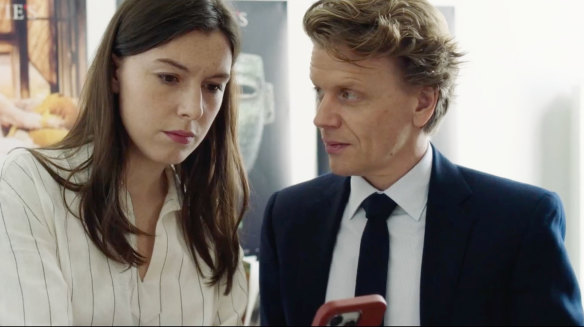Our Terms & Conditions | Our Privacy Policy
He’s had a hand in over 40 features. But this critic-turned-filmmaker remains a mystery
But now here he is facing me across the table in a Paris hotel room, a courteous Frenchman in his late 70s, unobtrusively well-dressed in dark colours, very bald, very wry. In a movie, he could imaginably be played by John Malkovich, although his sorrowful smile is gentler than that suggests.
Bonitzer is here today to talk about The Stolen Painting, not to look back over his whole career. Still, I can’t resist asking him if he learned anything from Rivette he’s been able to apply to his own approach to directing.
Working with Rivette, as Bonitzer tells it, was an experience unlike any other. In essence, his approach was to make up the film as he went along, with help from Bonitzer and Christine Laurent, at this period, the other regular member of the writing team. “We were writing during the shoot, which is very unusual.”
Each Rivette film was a trip, Bonitzer says, using the English word. Does he mean a trip as in a journey, or the psychedelic kind? “Both at once.” Guiding the filmmakers on their trip, however, was the sense of a clear goal. “With each film, there was a problem to be solved.”
The Stolen Painting was made in a more usual way, with a finished script before the start of the shoot. But as Bonitzer explains, here, too, it was a matter of solving a particular problem. “The problem was to bring together two separate worlds.”
The collision of these two worlds is the narrative engine of The Stolen Painting, which was based on a true story uncovered by Bonitzer’s script collaborator Iliana Lolic. The title refers to Wilted Sunflowers, painted in 1914 by the Austrian artist Egon Schiele, purchased by a Jewish art collector in Vienna, then confiscated by the Nazis in the late 1930s and long believed lost.

Louise Chevillotte and Alex Lutz in The Stolen Painting.Credit: Palace Films
In 2005, it resurfaced in France after the anonymous owner contacted the British auction firm Christie’s for an evaluation. Walking into the owner’s apartment expecting to find a copy, the valuers were astonished to find themselves face-to-face with the real thing.
It’s this once-in-a-lifetime moment of discovery the film depicts, along with the subsequent moral dilemma. The find has the potential to be extremely lucrative, but who deserves to profit?
While many of the details in The Stolen Painting are true to life, the characters are fictional: Bonitzer and Lolic gave themselves the freedom to invent, maximising the contrast between the film’s two worlds.
There’s the sophisticated world represented by Andre Masson (Alex Lutz), the cynical but perhaps not totally unprincipled Parisian auctioneer who discovers the painting.

Lea Drucker in The Stolen Painting.Credit: Palace Films
Far removed from this in every sense is the workaday world of Alsace in north-eastern France, home to Martin Keller (Arcadi Radeff), a young factory employee who has come into possession of the painting but is ill-at-ease with his apparent windfall.
While Bonitzer says there’s something of himself in all his characters, he admits that neither of these worlds are his own, nor was he drawing on any kind of direct experience in portraying them. Where the details of Andre’s work were concerned, he relied on research done by Lolic. As for the life of Martin and his buddies: “I had to make it up.”
But are there parallels between what the film shows and his own experiences in the film industry, where even larger sums of money are routinely in play? Yes, Bonitzer says, but only to a certain extent. Andre and his colleagues are all about the bottom line – whereas in movie making, there’s still some room for art for its own sake.
Loading
How true does this remain, though, in the streaming era, when film and TV are often understood as interchangeable forms of “content”? Again, Bonitzer grants the point but says that this is the side of the industry he tries to steer clear of. Not that he has a problem with TV as such: he was a fan of The Wire, for example, though there aren’t many shows that have caught his attention just lately.
Keeping Bonitzer’s background as a film critic in mind, I’m curious about a line early in the film when Andre is lecturing his deceptively obliging intern Aurore (Louise Chevillotte) about the thrill of the art valuation game. “The fantastic part of this job is turning up a real rarity. You’re Indiana Jones.”
This cinematic allusion, it turns out, wasn’t Bonitzer’s invention but taken straight from life – something Lolic picked up from an interview with one of the actual art auctioneers who served as partial models for the character.
Still, I point out that the Indiana Jones films also invoke the Nazi era, providing a sombre backdrop for a relatively lighthearted story. Bonitzer nods benignly. “That is, unfortunately, the only connection between my film and Spielberg’s.”
Again, the sorrowful smile, which could be ironic in more than one direction, giving the impression that even now I’ve met him, Pascal Bonitzer still remains a mystery man.
The Stolen Painting is screening as part of the Alliance Francaise French Film Festival, running until April 9 in Sydney and Melbourne. Jake Wilson travelled to France courtesy of Alliance Francaise.
[ad_1]
Images are for reference only.Images and contents gathered automatic from google or 3rd party sources.All rights on the images and contents are with their legal original owners.
[ad_2]


Comments are closed.